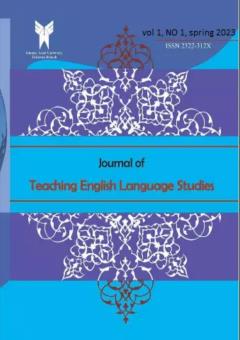Lexical Cohesion in Academic Discourse: A comparative analysis of Iraqi and native English writers’ published articles
محورهای موضوعی : Journal of Teaching English Language StudiesJaafar Issa Abdulabbas 1 , Fatemeh Karimi 2 , Ahmed Rawdhan Salman 3 , Mehdi Dalili 4
1 - Department of English , Isfahan (Khorasgan) Branch, Islamic Azad University, Isfahan, Iran
2 - Department of English, Isfahan (Khorasgan) Branch, Islamic Azad University, Isfahan, Iran
3 - English Department, College of Arts and Humanities, Al-Mustaqbal University, Iraq
4 - Esfahan Azad University- English department
کلید واژه: Lexical cohesion, academic discourse, simple repetition, derived repetition, Iraqi English writers, native English writers ,
چکیده مقاله :
Abstract
This present study intends to examine the occurrence and role of lexical cohesion markers in academic and scientific articles authored by Iraqi and native English speakers. Using wordlists, the study measures the prevalence of 'direct repetition' and 'related repetition' to map lexical patterns constructing cohesion across two corpora of academic publications. We analyzed the frequency data through close textual examination in order to explore the selection of lexical cohesive links and their non-linear connections in both corpora. Besides, we recruited a corpus-based approach to uncover semantic connotations of specific words in across the texts in both corpora. The findings suggested that a high rate of lexical cohesion markers does not correlate with effective writing skills. Out text analyses demonstrated that Iraqi authors often excessively used cohesive devices while their texts still contained serious problems with regard to developing ideas and arguments. The corpus analysis highlights Iraqi writers often produced cohesively weak texts due to deviating from standard semantic contexts. The study concluded that the integration of textual and corpus-based approaches offers an exhaustive understanding of how non-native authors employ lexical cohesion in both semantically and syntacti9caly well-formed structures.
Abstract
This present study intends to examine the occurrence and role of lexical cohesion markers in academic and scientific articles authored by Iraqi and native English speakers. Using wordlists, the study measures the prevalence of 'direct repetition' and 'related repetition' to map lexical patterns constructing cohesion across two corpora of academic publications. We analyzed the frequency data through close textual examination in order to explore the selection of lexical cohesive links and their non-linear connections in both corpora. Besides, we recruited a corpus-based approach to uncover semantic connotations of specific words in across the texts in both corpora. The findings suggested that a high rate of lexical cohesion markers does not correlate with effective writing skills. Out text analyses demonstrated that Iraqi authors often excessively used cohesive devices while their texts still contained serious problems with regard to developing ideas and arguments. The corpus analysis highlights Iraqi writers often produced cohesively weak texts due to deviating from standard semantic contexts. The study concluded that the integration of textual and corpus-based approaches offers an exhaustive understanding of how non-native authors employ lexical cohesion in both semantically and syntacti9caly well-formed structures.


